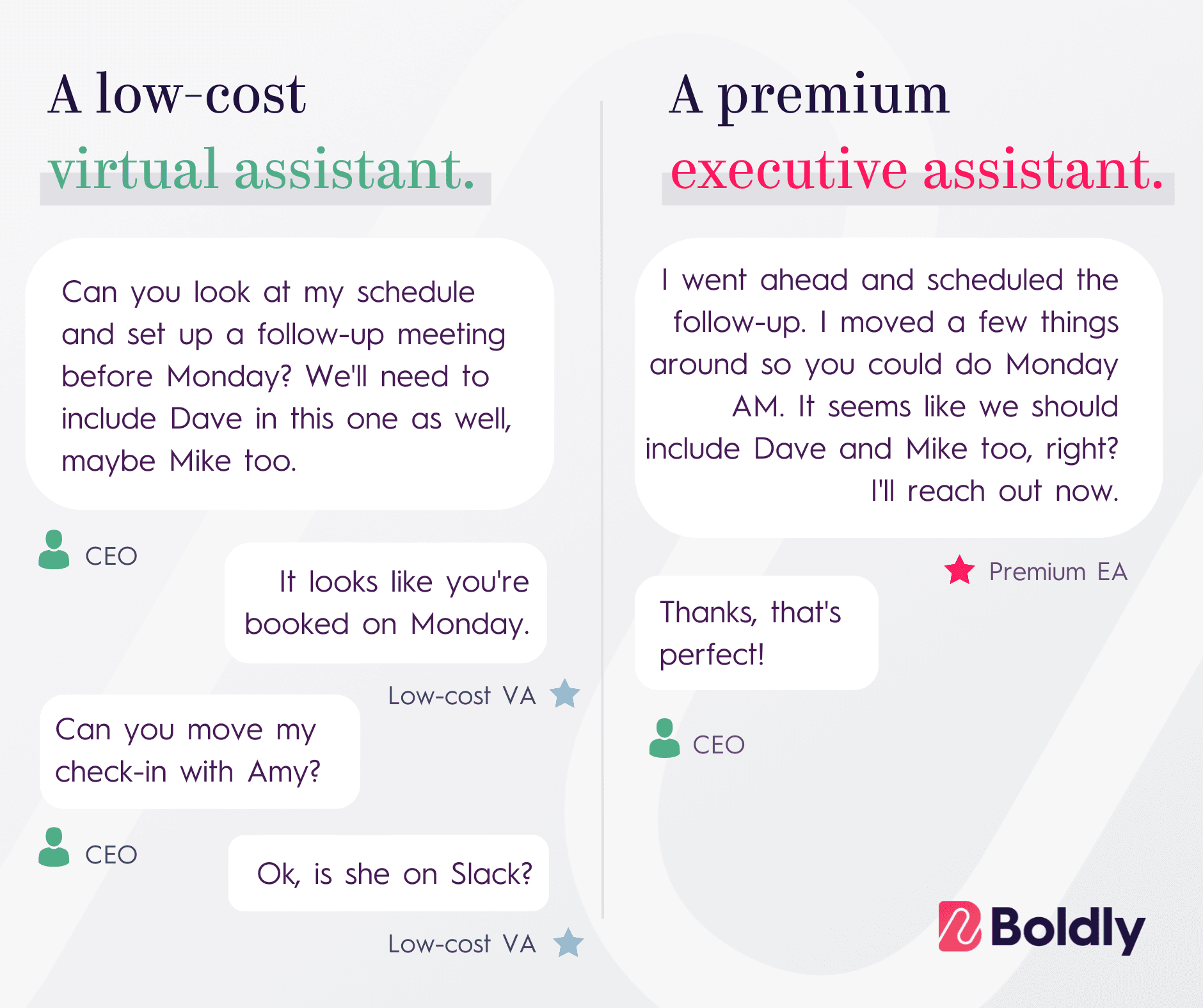Every assistant offers help, but not every kind of assistant delivers the same results.
By the time most executives reach out to us, we don’t have to convince them that they need support. The question isn’t if they should hire an assistant—it’s how to find one that will deliver the greatest impact.
As CEO Stu Loeser put it: “I was able to increase my productivity easily by 15–20% when I brought my Boldly executive assistant on board; she saved me that much time.”
A boost in efficiency means a boost in bottom-line results. And the best part? You don’t need a full-time, in-house assistant to see the difference.
There’s no shortage of virtual assistant companies or remote executive assistant company options, but not all support is created equal.
So why invest in a premium executive assistant? What sets a high-level EA apart, and how does that translate to real-world results?
The difference is mindset, expertise, and impact.
Here’s how a premium EA stacks up against conventional VA/EAs—and why even a few hours of high-level support per day can transform an executive’s productivity.
The Impact Of A Premium Executive Assistant


Conventional assistants can encompass everything from less experienced EAs to low-cost, lower-level virtual assistants. But titles alone don’t tell the full story.
Most virtual assistant staffing agencies match you with a 1099 contractor. While this can work well for short-term, project-based work, relying on contractors for ongoing executive support comes with risks, including higher turnover and potential legal compliance issues.
So beyond compliance, what’s the real difference between a premium executive assistant and a conventional EA/VA?
How a Premium EA Handles Your Inbox, Calendar, and Travel
The difference between a conventional assistant and a premium executive assistant comes down to more than just skill—it’s about strategy, proactivity, and impact.
While a conventional assistant focuses on executing tasks as directed, a premium executive assistant takes ownership, anticipating needs and optimizing workflows to keep you efficient and focused.
Here’s how that distinction plays out in three key areas: email, scheduling, and travel.


- A conventional assistant helps with email organization, flags important messages, and follows up as directed.
- A premium executive assistant goes further—prioritizing emails, drafting responses, and even managing your inbox to ensure nothing slips through the cracks. They act as a strategic filter, ensuring only the most important messages reach you.
Scheduling
- A conventional assistant schedules meetings based on your instructions and sends reminders.
- A premium executive assistant takes a proactive approach, aligning your calendar with your priorities, negotiating meeting times to optimize productivity, and resolving conflicts before they arise—acting as a true gatekeeper for your time.
Travel
- A conventional assistant books travel based on your instructions and provides an itinerary for review.
- A premium executive assistant anticipates your travel needs, researches the best options, manages logistics like visas and last-minute changes, and ensures you have a seamless experience—without requiring your direct involvement in the details.
Administrative vs. Leadership Support: The Premium EA Advantage
The difference between a standard virtual assistant and a premium virtual assistant can be summed up with one word: proactive.


Assistants Who Are Reactive vs. Proactive
- A standard executive assistant does the work you assign and lets you know if there are issues. They can provide updates on how things are going. But you are still the top-level decision-maker and have to plan those assigned tasks. You are the one that kicks action into gear, and the standard assistant reacts to those instructions (reactive).
- A premium virtual assistant anticipates, and that’s the big difference. They don’t wait to be told what to do; they already know. They are proactive, making recommendations on workflow improvements, resolving issues, and seeing a project through without you needing to babysit. Because they are proactive, not only can they give you back your time, they can even boost your business.
Assistants Who Offer Admin Support vs. Leadership Support
This proactive element is the reason why premium assistants provide leadership support, not just administrative support.
They are able to build relationships with your clients and team members and represent your brand professionally. They are able to make wise suggestions on more advanced new tools, system changes, or project solutions.
And because your premium executive assistant is proactive, they help you do the same. No longer are you relegated to being reactive to looming deadlines or projects that went off track. They keep you ahead of the game instead of you breaking even or behind it.
A premium executive assistant will literally give you back your power to scale, strategize, and forecast—all the things you can’t do if you’re working through your 1000+ email inbox and not even sure what instructions you’d give a standard assistant if you had one.
Investing in a premium executive assistant is part of any plan for long-term success.
What Sets a Premium EA Apart: Responsibilities, Skills & ROI
A premium executive assistant delivers superior results through proactive problem-solving, high-level task management, and an exponential ROI on your time.
What does that look like in practice? We’ll break it down into three categories:
- Scope of responsibility
- Skill levels and expertise
- Cost and value
Read more: What’s the difference between a virtual assistant and a remote executive assistant?
1. Scope Of Assistant Responsibilities
A standard assistant can handle basic administrative and personal tasks as long as they require limited decision-making. Standard assistants react to your instructions.
They can:
- Send emails as instructed, draft responses based on provided templates, or flag important emails for you to respond to.
- Manage your calendar by scheduling appointments and meetings according to your availability.
A premium assistant takes on a more complicated level of responsibility, acting proactively instead of reactively.
In their case, they might:
- Send emails on your behalf, not just following instructions but also anticipating the best approach and tone based on your preferences, priorities, and the context of the communication.
- Book travel based on your needs and find the best options and prices while considering your preferences and coordinating with your calendar to avoid conflicts. They’ll add a car rental and other necessities without you asking because they know it’s what you’ll need.
A virtual assistant is a great option if you prefer to detail exactly what you want them to do, but it still burdens you to provide clear instructions and double-check that everything’s been completed.
A premium assistant doesn’t need that level of micromanaging and can take general instructions and extrapolate all that you’ll need to have done to accomplish it properly.
In fact, our clients say that their Boldly executive assistants manage them!
2. Different Skill Levels And Expertise
A low-cost virtual assistant typically has the skills for basic or entry-level support. They do not have (nor need) specialized training in software or specific areas of knowledge. Or they may have a specific skill set in a particular area, which is the only place they are used.
For example:
- A standard assistant can provide data entry in HR as long as someone has provided specific guidance on what needs to be done.
A premium assistant has advanced skills and experience covering a broad range of knowledge—from specialized skill sets to deep industry insights. They can perform tasks as requested (like the previous list) but will see and apply it to the bigger picture, including your goals and the company’s goals.
- A premium executive assistant will understand marketing enough to oversee others or do it on their own. They won’t compartmentalize marketing and will be able to see how it fits into the bigger picture because they’re involved in the bigger picture.
- A premium assistant can not only do HR data entry if necessary but can manage your employee onboarding programs, review or draft policies, spot trends, or make recommendations to HR management based on executive preferences elsewhere.
A standard assistant is a great option if you have specific or limited skill requirements, but if you’re looking for someone to provide broad support in many areas, keeping it under the umbrella of the larger strategies your business adheres to, a premium assistant is your best option.
3. The Difference Between Cost And Value
It’s easy to confuse cost with value.
While a conventional executive assistant may be less expensive since they are mainly focused on task completion, the value is also less.
- Some are paid on an hourly or contract rate or are part of a pooled option (in which the next assistant available is the one who does your work).
- You must define the role and the task, and they will do what you ask them to do.
- Turnover tends to be high and consistency tends to be low.
A premium assistant comes at a higher rate because they deliver more value.
- In the long run, they save you time because you don’t have to micromanage. Instead, ask them to deliver an outcome without defining how you want it done.
- They can enhance outcomes (not just complete tasks) over time because of their expertise.
If empowerment and a premium executive assistant are what you are looking for, we’d love to speak with you and find the perfect match!




